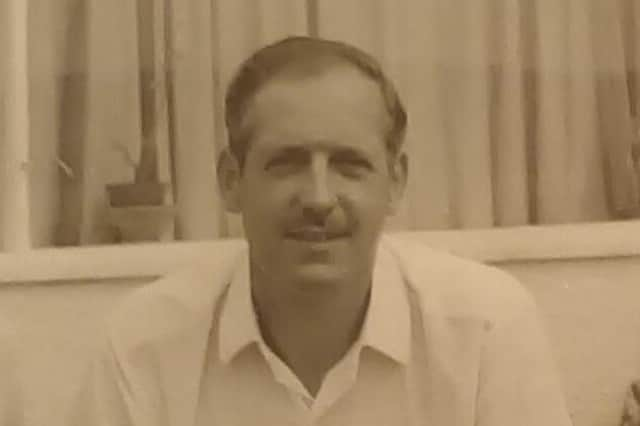Scotsman Obituaries: Dr Colin Walker, paediatrician who set up Dundee’s first special baby care unit


Colin Walker often said he worried that he spent more time looking after other people’s children than his own. The reality was that over the decades countless youngsters, among them the most fragile newborns, benefited immeasurably from that patriarchal concern.
In his long and distinguished medical career Dr Walker was a pioneer in the care of sick infants, becoming a paediatric cardiologist, developing a new life support technique for tiny babies and establishing special baby care units in Dundee.
Advertisement
Hide AdAdvertisement
Hide AdHe also led work that resulted in a computerised audit of all newborns in the UK, focusing on those who needed neonatal intensive care.
There had never been any doubt in his mind that he would go into medicine, the catalyst being his own ill health as a child.
Born in Edinburgh to medical publisher James Walker and his wife Alison, he was educated at Edinburgh Academy before chronic respiratory illness and severe asthma interrupted his schooling.
After transferring to the city’s Melville College he thrived and became head boy for the section of the school evacuated to Dumfriesshire during the Second World War.
Medically unfit for conscription, he then went to the University of Edinburgh to study medicine.
After graduating in 1946, he initially took up various posts in Edinburgh.
His first jobs in paediatrics were at the Royal Hospital for Sick Children, where he had spent considerable time as a patient.
Having decided to specialise in paediatrics, Dr Walker then underwent further training at Great Ormond Street Hospital for children in London, an opportunity only usually afforded to graduates from Oxford, Cambridge and the London teaching hospitals.
Advertisement
Hide AdAdvertisement
Hide AdIn 1957 a one-year secondment took him to Australia, to the Princess Margaret Hospital for Children in Perth.
By this time he had a wife, Anne, whom he met at a physiotherapy ball in 1948, and a young daughter, Hilary.
The family made the long journey by sea to fulfil his role of establishing the hospital’s first cardiac catheterisation unit. Dr Walker was then invited to the United States to become a paediatric cardiologist in the Department of Paediatrics at the University of Colorado in Denver.
There he developed a pioneering technique for the life support of very small infants by partial perfusion with a unique heart/lung/kidney system.
After six years in Denver and the addition to the family of a son, Huntly, they returned to Scotland, where Dr Walker took up an offer to develop neonatal services in Tayside, at Dundee Royal Infirmary. That was in 1964.
A few years earlier Scotland’s first purpose-built special baby care unit had been set up in Dundee.
The 20-bed facility followed collaboration between the Chair of Obstetrics in Dundee, James Walker, and the Professor of Child Health, John Henderson.
It was while Professor Henderson was on a fact-finding mission to America that he had recruited Dr Colin Walker as neonatal paediatrician, leading to his return to Scotland.
Advertisement
Hide AdAdvertisement
Hide AdThat same year the first baby in Scotland – and only the second in the UK – was treated with artificial ventilation, an achievement which took place in Dundee using a ventilator reportedly brought home on the plane by Dr Walker.
Great advances have since been made in the care of very ill infants but at the time Dr Walker was one of just a handful of paediatricians from across the UK who began to address the needs of sick newborn babies.
During his career – he transferred to Dundee’s new Ninewells University Teaching Hospital in 1973 – the care available shifted from simply keeping babies warm and offering some fluids to being able to provide them with life-saving intensive care with ventilatory support, intravenous nutrition and new treatments.
For several years Dr Walker was the sole consultant available to provide this care in Tayside and his dedication and commitment was exceptional.
Latterly he had additional colleagues and this allowed him to develop his ideas on audit of the service both locally and UK-wide.
He chaired several government committees addressing this issue and the outcome of this work was a computerised system that collated all data on newborn infants born in the UK, with a focus on those who needed neonatal intensive care.
In recognition of his contribution, Dr Walker was appointed President of the British Association of Perinatal Medicine which held its AGM prior to his retiral in 1986.
In 2007 he chronicled his career in I Also Ran: The Autobiography of a Paediatrician, in which he perceived himself as the gallant loser in many aspects of his life. In its preface he wrote: “This is a story about an ordinary person, who in many ways didn’t quite make it and who in the end failed to achieve his long-term career ambition.” His hope had been to secure the professorship of child health in Dundee, a position which eluded him.
Advertisement
Hide AdAdvertisement
Hide AdBut those who knew Dr Walker dismiss his “also ran” status, recalling a man of great meticulousness, charm and the highest standards: a pioneer, distinguished researcher, astute clinician and a remarkable colleague and friend. Still determined to help advance the world of medicine, he left his body for medical research.
Predeceased in 2021 by Anne, he is survived by their children Hilary and Huntly, his sister Pam, six grandchildren and four great grandchildren.
If you would like to submit an obituary (800-1000 words preferred, with jpeg image), contact [email protected]